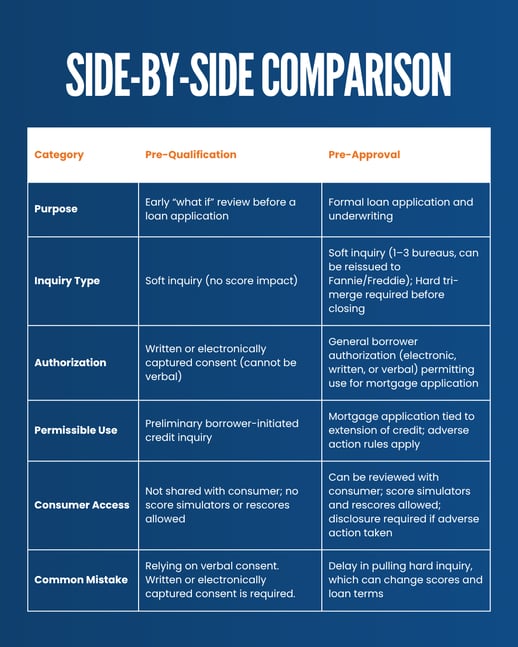Pre-Qualification vs. Pre-Approval:
Borrower Authorizations & Permissible Purpose
One of the most common client questions is the difference between Pre-Qualification and Pre-Approval credit reports. While they sound similar, they serve very different purposes under the FCRA. Knowing the distinction protects compliance, avoids borrower confusion, and creates a smoother borrower experience.
- Purpose: To determine what loan products the consumer may prequalify for. This is an early-stage “what if” review before a loan application.
- Credit Pull: Soft inquiry (no impact on the borrower’s credit score).
- Authorization: Written or electronically captured consent is required (verbal consent is not permitted).
- Consumer Access: Report cannot be shared with the consumer or third parties. Score simulators and rescores cannot be run on this report type.
- Common Mistake: Relying on verbal consent. Written or electronically captured consent is required.
- Purpose: Extension of credit permissible purpose tied to a mortgage application. This is a formal stage connected to underwriting.
- Credit Pull: Soft inquiry (1, 2, or 3 bureaus) that can be reissued to Fannie and/or Freddie for preliminary findings. A new hard tri-merge report must be pulled as the loan progresses and prior to closing.
- Authorization: General borrower authorization (electronic, written, or verbal) permitting use of credit for a mortgage application.
- Consumer Access: Report may be reviewed with the consumer. Score simulators and rescores are permitted. Disclosure is required if adverse action is taken.
- Common Mistake: Waiting too long to pull the hard inquiry, resulting in score changes that can alter loan terms.

Why It Matters
Pre-Qualification is a soft inquiry with written consumer consent, not shared with the borrower. Pre-Approval is a soft inquiry in the formal application stage, reissuable to Fannie/Freddie, and ultimately a hard inquiry before closing. Adverse action rules apply. Getting this right avoids compliance risks, reduces confusion, and helps create a smoother borrower experience.
Disclaimer
This summary is for informational purposes only. Always follow the FCRA and applicable state and local laws for full compliance.
